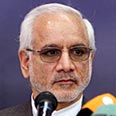
Iranian VP: We've successfully produced nuclear fuel pellets
Major technological advancement for Tehran nuclear program means Iran can power its heavy water research reactor, IAEA declines comment. Meanwhile EU's Solana continues to push Tehran to resume talks
Iran has produced its own nuclear fuel pellets of uranium oxide for the first time to power its heavy water research reactor currently under construction, Vice President Gholam Reza Aghazadeh said Saturday
according to the official IRNA news agency.
The announcement represents a major technological step forward as it is the first time the Iranians have said they can turn uranium into the fuel pellets that are inserted into the fuel rods powering nuclear reactors.
''Fuel pellets to be used in the 40-megawatt Arak research reactor (in central Iran) have been produced,'' IRNA quoted Aghazadeh, who heads the country's Atomic Energy Organization, as saying Saturday.
Iran is also working to produce fuel pellets for its light water reactors such as the one being built with
Russian assistance in Bushehr on the Persian Gulf coast using enriched uranium, a process the US and its allies have called for an end to because they say, if enriched further, can be used to build nuclear weapons.
''Nuclear fuel pellets for use in heavy water reactors are produced from uranium oxide, while the pellets for use in light water reactors are produced from enriched uranium, but the technology to produce nuclear fuel pellets are almost the same,'' Iranian nuclear scientist Rasoul Sediqi Bonabi said.
Producing enriched uranium fuel pellets is the final stage in a long process that begins with extracting the uranium ore, converting it into a concentrate called yellow cake before it is processed into a gas that then has to be enriched using centrifuges.
Aghazadeh said they are already testing the fuel pellets and the fuel rods produced at its nuclear fuel production facilities in Isfahan, central Iran.
Aghazadeh also dismissed any possibilities of slowing down in Iran's uranium enrichment program, which has already prompted two rounds of sanctions from the UN.
The Vienna-based International Atomic Energy Agency, which is probing Iran's nuclear fuels out of concerns it could be used to make weapons, had no comment.
Solana dossier could lead to more sanctions
Iran is likely seeking to display its achievements ahead of an upcoming EU report on its nuclear program authored by EU foreign policy chief Javier Solana. Solana is scheduled to meet with top Iranian negotiator Saeed Jalili on Friday to discuss the program.
Solana has been trying to persuade Tehran to resume talks on suspending uranium enrichment in exchange for a package of political and economic incentives, but Tehran has refused to offer concessions.
A report by Solana, due by the end of the month, will along with the IAEA's findings form the basis for a UN Security Council decision whether to slap more sanctions on the Islamic republic, following two previous sets of sanctions in December 2006 and March 2007.
Dudi Cohen and news agencies contributed to this report










